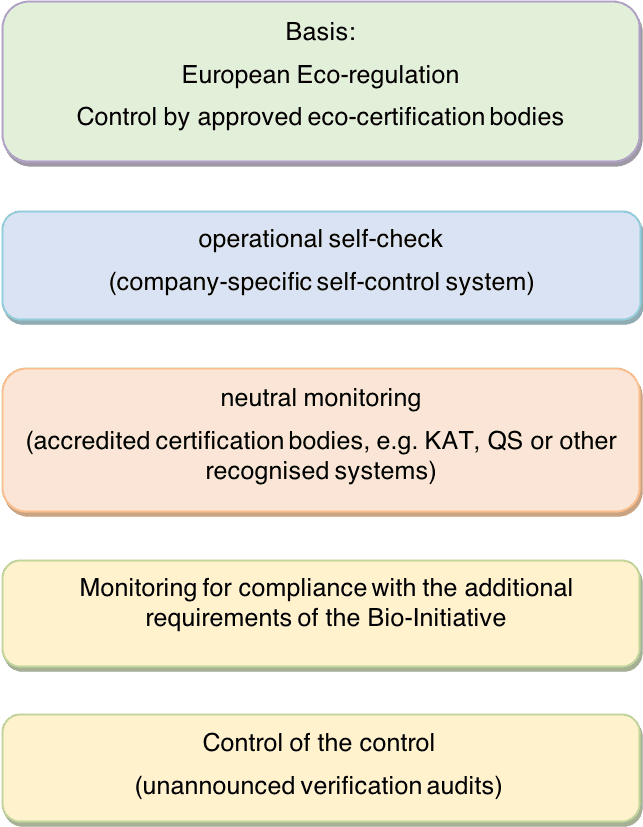The control system of the Bio-Initiative
The Bio-initiative system carries out tests at folling levels:
- organic regulation
- operational self-check
- Control by neutral certification bodies
- Control of the BIO initiative
- Control of control (Integrity)
The requirements for the approval of certification bodies derive from the requirements of the
Organic Regulation.In addition, accreditation according to DIN EN ISO / IEC 17065 must be proven.

Explanations:
Audits in participating companies are generally unannounced with the exception of audits where the participation of a responsible employee is required. Certification audits are inspections in which the company receives a certificate of approval after successful completion. This applies in each case at least one year, ie from the day of the exhibition for another 12 months. If the result of the audit does not justify the issue / continuation of a certificate, a follow-up audit becomes necessary. As part of the re-audit, the responsible certification body focuses on the implementation of the agreed corrective measures.
Base:
The specifications are the legal requirements of the Council Regulation (EC) No. 834/2007 and its implementing provisions with Commission Regulation (EC) No. 889/2008 and the specific requirements of the Bio-initiative. These must be checked at least once a year. The controls are unannounced. The certificate will be extended for a further year from the date of the inspection.
Company self-control:
The requirements of the Bio-initiative require a company self-control system. The basis is the criteria set out in the organic regulation and the bio-initiative criteria. The verification and compliance with the criteria is carried out by the appointed certification authorities.
Neutral control:
Within the framework of the neutral control, so-called system tests are carried out by accredited certification bodies that fulfill the requirements of DIN EN ISO / IEC 17065 or DIN EN 45011 and the basic version of the organic regulation in their current version. These are used to check compliance with all requirements, eg. B. traceability and traceability measures.
Control of Integrity:
Integrity or verification audits are used to verify the system for verification of all requirements (control of control). The controls are initiated by the Bio-Initiative. The frequency depends on the previous test result. In the case of a detected deviation and a necessary certificate withdrawal, the responsible certification body is informed.
valuation parameters
95-100%
No or only minor differences were found during the check. A rating with "C" is not allowed as a parameter. Compliance with hygiene measures, self-checks and traceability is ensured. Any detected minor deviations must be remedied as soon as possible. The number of verification audits can be reduced.
85 - 94%
There were slight but still acceptable deviations found. However, compliance with the requirements is largely ensured. The deviations must be demonstrably remedied as soon as possible.
75 - 84%
Deficiencies were detected, but with correctable deviations. Compliance with the specifications is still ensured. The deviations must be remedied as soon as possible and demonstrably.
<75%
Failed, no approval, ie the operation does not meet the specified standard. Re-examination of the system conformity requires a re-audit.
n / A
If one or more audit points do not apply to audited operations, they may be rated "na" by the auditor (not applicable). Such a rating is possible for all checkpoints. Any rating with "na" must be explained in the test report.
M = major
A "Major" can be awarded to all requirements that are not defined as "KO" requirements. The auditor may award a major if failure to comply with a requirement violates legal requirements or poses a threat to food safety or animal welfare. Furthermore, the auditor may award a major if agreed corrective measures have not been implemented on time. When a major is awarded, 15% of the overall result will be deducted. If the company reaches at least 75% points, the assessment "provisionally passed" and the issuance of a certificate with a shortened duration until the agreed re-audit deadline. If the result of the award of a Major results in <75%, this will automatically result in a "fail" rating and no certificate can be issued.
KO
There are large, unacceptable deviations from the nominal state, which lead to the complete non-fulfillment of the test criterion. If an auditor awards an evaluation to a test point marked with a "KO", this leads to the deduction of 50% of the possible total score and thus immediately to the assessment "failed". No certificate can be issued. Depending on the severity of the defect, the operation or exclusion is blocked.




